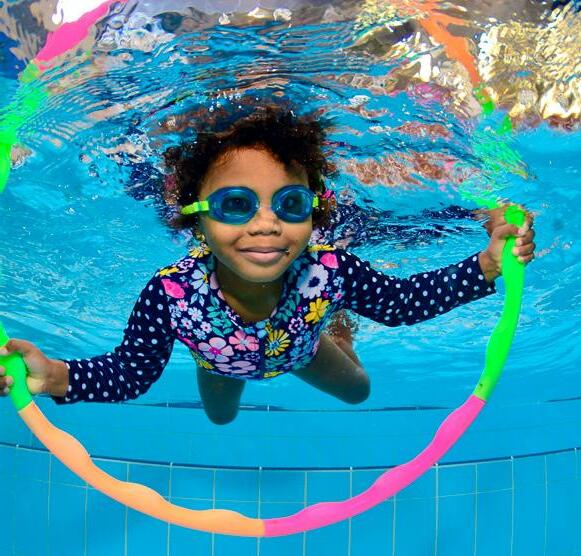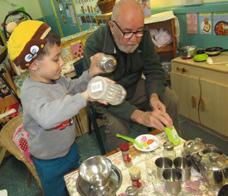
7 minute read
Tinkering
‘Just Keep Swimming’ ASSA’s key message for winter
Emily McNeill > General Manager of Australian Swim Schools Association
While Australia is a country for all seasons, Queensland is considered home to an endless summer with warm, sunny days all year round. Surrounded by the great blue and an abundance of inviting waterways, including bustling beaches, world-heritage reefs, rivers, and creeks stretching as far as the eye can see, our tropical climate make it difficult to stay out of the water.
That’s why it’s crucial that every Australian learns to swim from a young age and parents, teachers and carers must remain diligent in teaching swim safety to the next generation all year long. Despite our ongoing sunshine, recreational swimming and swimming lessons are still considered a seasonal activity. Throughout winter, there is a significant drop in swimming lessons as many families take a break or opt for dry activities as it gets cooler. This break places children at higher risk of drowning once summer rolls around, especially following two years of ongoing disruptions due to the Covid-19 pandemic which saw millions of swimming lessons lost and resulted in a national skills regression. Swimmers may be less confident than a year ago and to combat this the Australian Swim School Association (ASSA) is urging families to enrol in swimming lessons this winter. As the nation’s peak industry body for swim schools, ASSA serves to enhance the learn to swim and water safety industry, advocating for swim school business 365 days a year. According to the Royal Life Saving Society of Australia, Queensland recorded the second largest number of drowning deaths last year with 66 in total during 2021. Almost a quarter of these drowning deaths occurred during winter.

In a bid to reduce the number of fatal and non-fatal drownings this year, ASSA has shared the following reasons why families should enrol in winter swimming lessons.
1. Winter lessons could be the key to overcoming the national skills regressions which resulted from the
Covid-19 pandemic
The skills and behaviours that are taught in lessons need constant reinforcement throughout the year. The risks posed by drowning don’t go away in the cooler parts of the year, so neither should the lessons – they are one of the most proactive things a parent or carer can do for a child. Continued swimming lessons help families keep swim safety and each of the vital layers of protection front of mind. If a child missed out on lessons last year or in the beginning of this year, the months during winter provide a great opportunity to make up for lost time and ensure early swimmers are progressing their development. There was a six per cent increase in drowning deaths across the state in 2021 compared to the previous year. Furthermore, there was a 9 percent increase in the 0-4 years age group compared with the 10-year average, indicating the time for change is now.
2. It’s a great way to keep children active
As the great outdoors become less inviting throughout the colder months, swimming lessons are a great way of staying active. With most swim schools offering indoor heated pools, the days of suffering in ice-cold water are long gone. Being indoors, weather can’t get in the way and it’s considerably more inviting than stepping outside. Adding to this, swimming throughout the colder months will not only improve fitness, it can also help children build up their immune system.
3. Swimming lessons help children develop life skills
A study by Griffith University found that those who participate in swimming at an early age achieve personal milestones much sooner than the average population, regardless of social background or gender. Swimming lessons have been proven to help children develop essential academic, social, and personal skills plus improve hand-eye coordination. Like any sport, it’s a great opportunity for social interaction no matter the age. Therefore, children who continue lessons throughout winter are also at an advantage in other aspects of their development compared to those who take a break.
To help swim businesses lead the charge to ensure children keep swimming safer, all year round, ASSA has developed the Safer Water Warriors. Built on ASSA’s SAFERswimming Layers of Protection message, the SAFERwater Warriors are a team of friendly mascots aimed at under 5 year olds. Every layer of protection is necessary to keep children SAFER:
• Swimming Skills • Adult Supervision • Fences & Gates
• Emergency Action Plan • Reduce the risk for safer swimming
With a commitment to providing all-inclusive education around swim safety, ASSA continues to develop and promote international leading guidelines, professional development programs, growth opportunities and business support for its members. While swim schools create their own curriculum, ASSA assists them to ensure water safety skills are incorporated into each lesson and helps them be the best running businesses they can be. Created by swim schools for swim schools, ASSA is the only body in Australia with a Constitution where Swim Schools are the voting members.
For more information: www.australianswimschools.org.au
Get to know your new ACA Qld CEO
Please tell us a little bit about you and your history?
I started my career at Deloitte, a global accounting firm, in the restructuring division of the Brisbane office. I was responsible for managing companies in administration from diverse industries such as theme parks, manufacturing, hotels and clubs, shopping centres and First Nations corporations. The opportunities to work in such a diverse range of businesses both across Australia and in Southeast Asia, helped me to understand the drivers in business and the importance of strong customer service. After completing my MBA I had the opportunity to work in the ECEC sector and continue ongoing work with First Nations people. In my most recent position, I was the Director of Operations of a residential college at the University of Queensland accommodating over 300 students. Having worked in the ECEC sector to supporting students at university, I have come to appreciate the needs of children at all ages in their development. I am married (to Kate) and have two boys aged 15 and 17. When I am not working I am busy moving both boys between sporting games and trainings in cricket and basketball, depending on the season. From my work with First Nations people, I have discovered that I have First Nations heritage. I am connected to the Gangalidda First Nations people which are located in Burketown inland from the Gulf of Carpentaria.
How did you first become involved in ECEC sector?
Something that always frustrated me after working in a remote community was that all children did not have access to the same learning and development opportunities across the country. Having completed my MBA, I was offered an opportunity to be involved in the ECEC sector. I was involved in the development, set up and operations of two services on the Gold Coast and then worked for a development company in Australia and other parts of the world.
What do you think are the biggest challenges facing the sector?
The number one challenge facing the sector in my mind is ensuring that centres have a supply of qualified and experienced staff to support the development of the children in their care. It is important that as a sector, the community understands the important role early learning services play in the development of young minds and bodies and this can only be achieved through having experienced staff on the floor. I am excited to have the opportunity to meet members and help to advocate to government to continue to build the awareness and importance of the early learning sector in the community.

Ageless Play
- the magic of bringing children and community residents together in the Kindergarten environment.

At the Prince Charles Hospital Early Education Centre, we pride ourselves on our invaluable and unique intergenerational play sessions with our wonderful Grandfriends who visit us each week.
Every Thursday, our Grandfriends come along to spend quality time with our Kindergarten children. Their visits with us are always filled with enchantment, joy, and laughter as they become involved in many aspects of our magical program. Engaging in a variety of enjoyable activities, some of which include singing, flower arranging, role-playing, gross motor, and cooking, our Grandfriends have begun to form caring friendships with our children. These purposeful and special moments provide immense benefits to our elderly, helping to build positive relationships that support connection, cognitive skills, confidence, social interaction, inclusivity, and a sense of wellbeing. These benefits also extend to our own children as they have opportunities to embrace empathy, diversity, and special connections. Our children are always excited on ‘Grandfriends Day’ and absolutely love having our special Grandfriends visit us.









